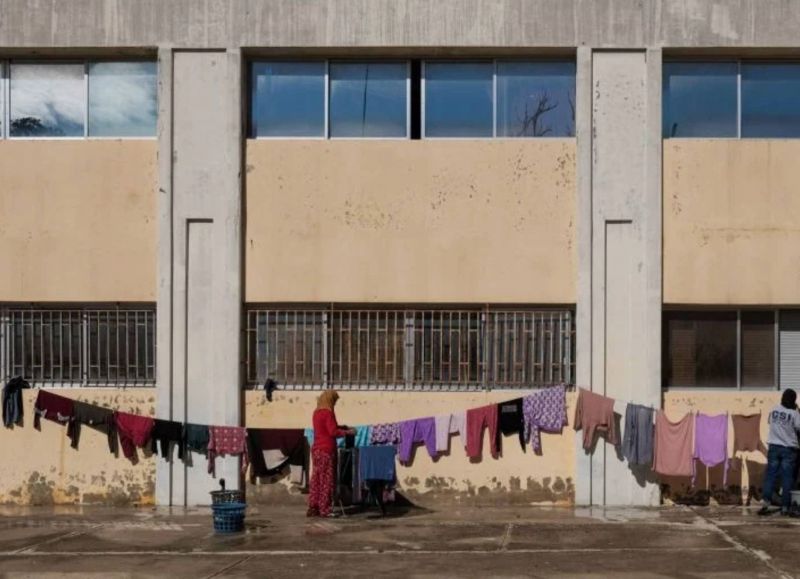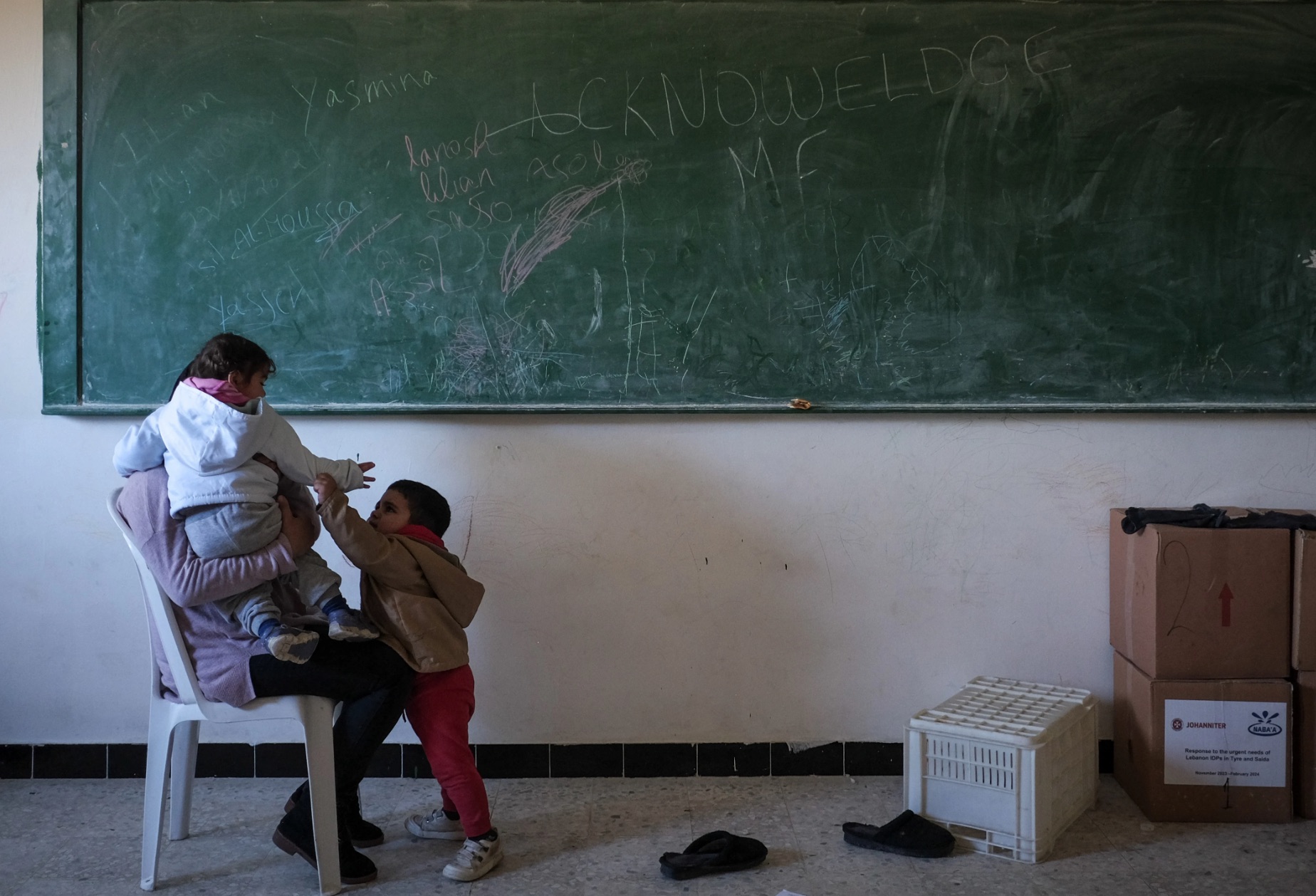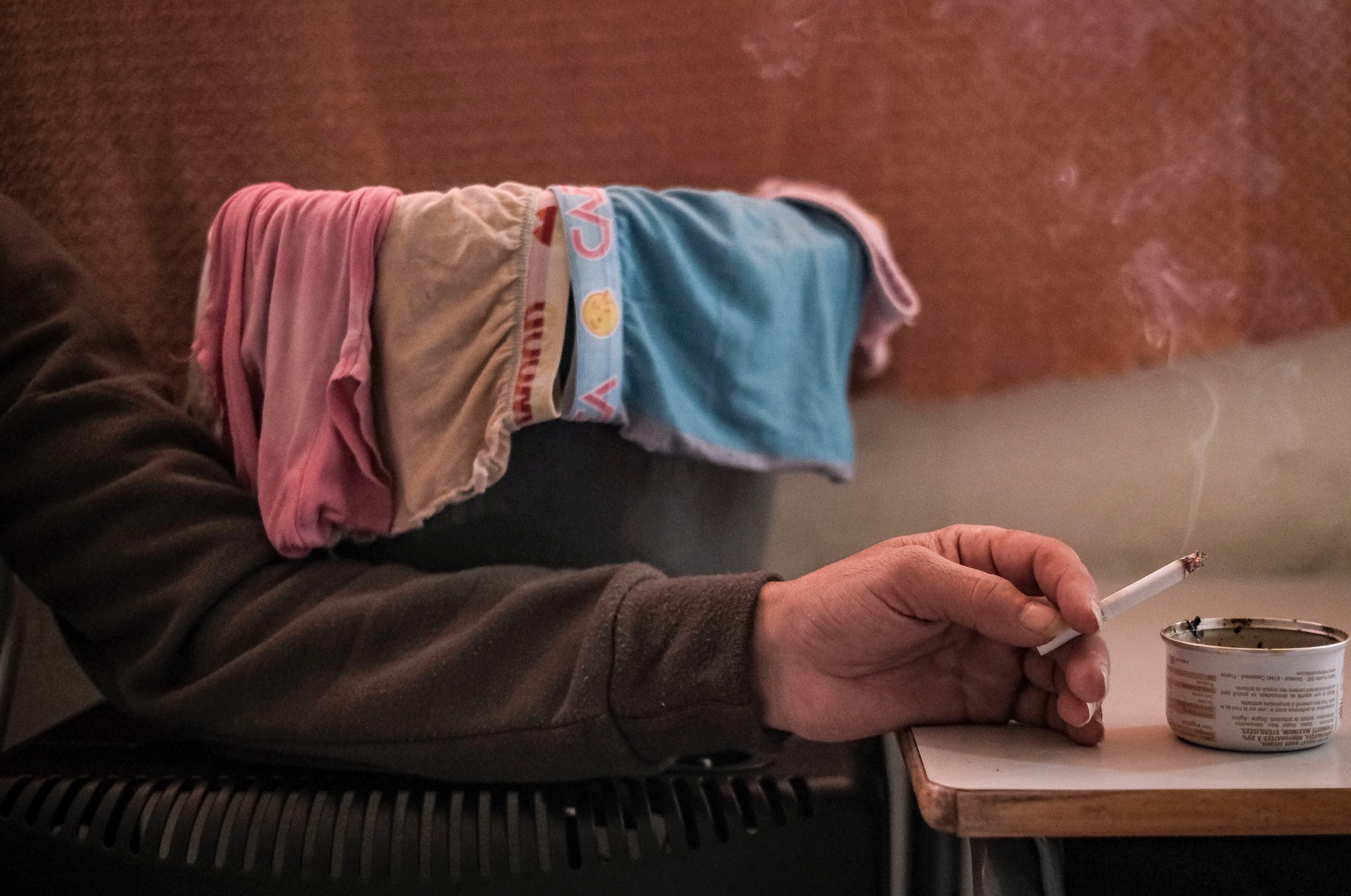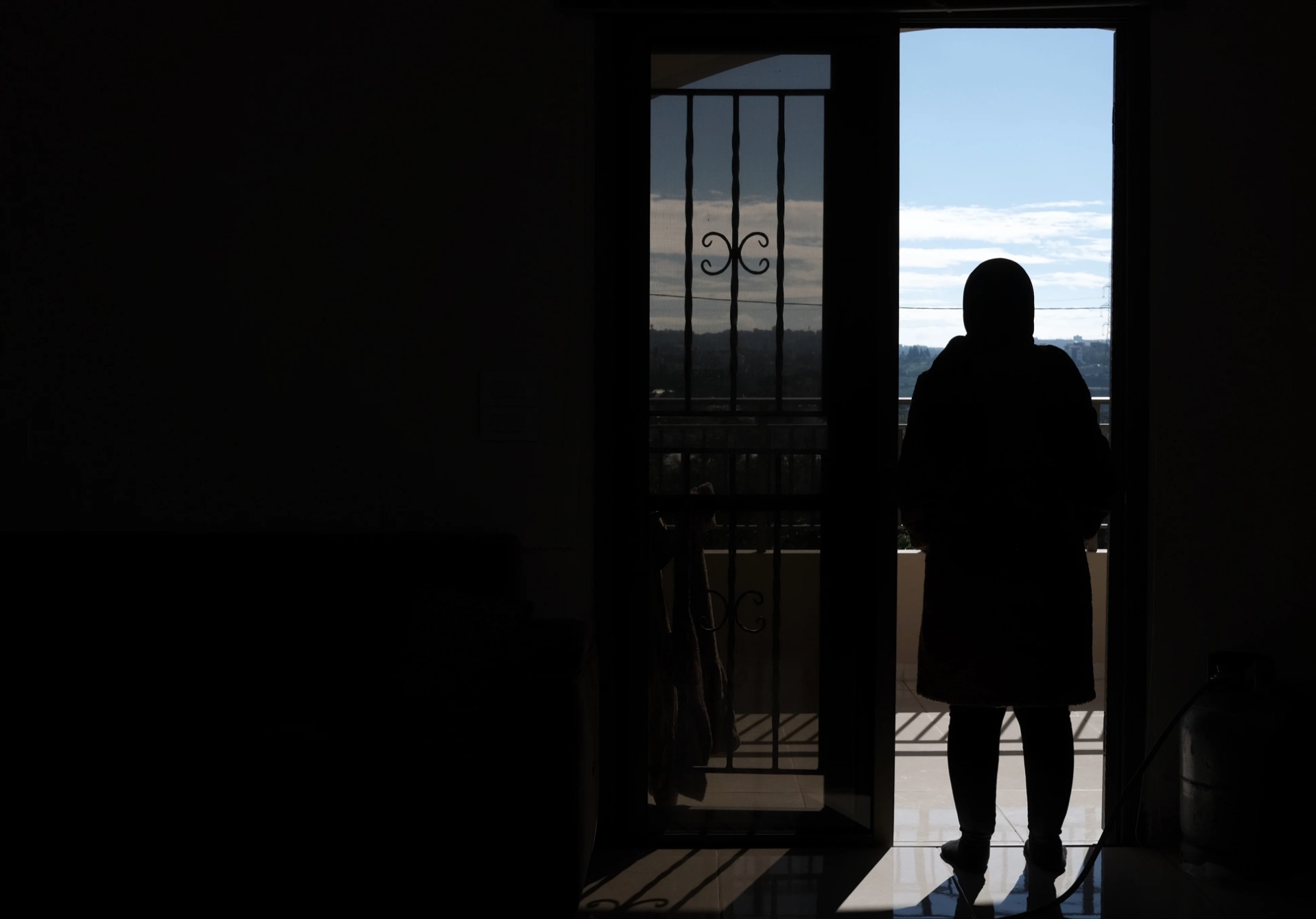
Laundry hangs outside a schoolyard-turned-shelter in Tyre. (Credit: João Sousa/L'Orient Today)
“This war destroyed our lives,” said Rima, a woman who has been living out of a classroom at Sour Technical High School, now a makeshift shelter, since border clashes forced her to flee her home.
While for the past few months, most of the country has been living in fear of having the war upturn their lives, this fear has already become a reality for the 86,665 people who have been displaced by the clashes, particularly in Sour, where the largest number of the displaced are accommodated.
 Displaced families experience growing despair as they await the day they can safely return to their homes. (Credit: Joao Sousa/L'Orient Today)
Displaced families experience growing despair as they await the day they can safely return to their homes. (Credit: Joao Sousa/L'Orient Today)
At first glance, things seemed not to have changed since our last visit in October, when the clashes first broke out. The classrooms looked the same: there were mattresses spread on the floor, clothes piled on desks, and mini gas canisters for making coffee.
Outdoors, people gathered around a hookah to kill time. But they hardly exchanged a word or a glance. In the playground, women hung out the laundry.
“Don’t you have LL500,000 for me?” asked an elderly woman. She was not the only one to ask.
The displaced took refuge in emergency shelters, with host families, or rented houses, for what they thought would be days, or weeks. But now Rima, and thousands like her, have found themselves in a difficult situation, and savings are running dry. Despair has taken over and the disappointment grows.
At the high school-turned-shelter in Sour, the days are the same. Rima, a resident of Boustan, a small Sunni town in Sour, and her three children spend their days between the four walls of a classroom with her in-laws. Her life is now limited to showering her little ones using a gallon and a bowl in the middle of the room where ten people sleep, queuing to use the restroom, and doing the washing by hand.
“I can’t stand it anymore,” she said, exasperated.
Rima was once a school teacher, and today, she can’t afford to rent a flat. “And even if I could, how would I be able to feed my children?” she said.
Like all those who have taken refuge at the school, Rima and her family rely on aid provided by NGOs, who have provided heating, mattresses, household products, snacks, etc. “Sometimes, associations give extra aid to children. My sister-in-law goes completely nuts on me when she doesn’t have any and accuses me of wanting to keep everything for myself. She wasn’t like that before the war,” she said.
“Everyone here is jealous,” said Mohammad*, a farmer from Beit Lif in Bint Jbeil who is living in another classroom. “And on top of that, some secretly come to help people affiliated with their own religious community or village.”
A few days ago, a local man asked Mohammad how many families came from Beit Lif to offer help. “I told him: either you help everyone, or I don’t want anything,” he said. “Hezbollah gave us $100. As if that was enough. We’re dying of hunger and this war was imposed on us. If you want to wage war, you have to help people!” he said, adding that he lost the seasonal harvest he depends on.
To survive, Mohammad is constantly getting into debt with local businesses. Although the July 2006 war was more “violent” (with more than 1,200 deaths, mostly civilian, in the space of 33 days, compared with 219 deaths, including 196 fighters, since Oct.8), he said the price of this war is much higher.
“We weren’t going through an economic crisis at the time... I’ll have to sell my van to pay all my debts.” Mohammad’s five children were forced to drop out of school. The headmistress reproached him for their inappropriate clothes.
 A displaced woman smokes a cigarette in a classroom in Tyre. (Credit: João Sousa/L'Orient Today)
A displaced woman smokes a cigarette in a classroom in Tyre. (Credit: João Sousa/L'Orient Today)
“I explained to her that we were displaced persons, and we don’t have our clothes, but she continued to hurl criticism. No solidarity has been shown,” he said. “We didn’t have any money to buy them [school] supplies anyway,” added his wife, who sat next to him.
Khaled*, a man from the same village who lives in the same room, could not pay his daughter’s university fees. “It was her senior year at university. I couldn’t get an education because of the wars, and now my daughters are going through the same thing, even though I did everything I could to prevent this from happening again,” he said.
“This is no way to live,” said Mohammad.
‘All we want is stability’
This despair has impacted more than just the displaced living in improvised shelters. Eighty percent of those displaced have been accommodated in private homes , while 15 percent rented their own accommodation and four percent have taken shelter in their second homes. Conditions for these groups are generally better but fall the same, the cost of being forcibly displaced has become increasingly harder to bear.
This is the case of Emné and her family, who fled their home in Khiam and took refuge in Baysarieh, another Shiite town in Nabatieh. For the past month, Emné has been living with her two children aged four and five, her husband and her mother-in-law in a house perched on a hill overlooking the mountains, made available by an acquaintance who lives abroad. “Everything closes after 6 p.m., so I really feel like I’m living in a village. In Khiam, at midnight, the cafes are always full,” she said.
In Baysarieh, they are at a safe distance from the bombings. But not far enough not to hear them. Emné and her family left their home three weeks after the start of the war. One day, the family was trapped at home for four hours while the bombardment raged outside.
“We didn’t dare go outside. I was waiting for death to come,” she recalled. “I can only blame Hezbollah for one thing: They fired rockets [from a spot] right next to us when we were at home. They could have warned us,” she said.
Since then, the family moved three times across the country — before settling in this last house, where Emné said she can finally breathe.
“Why do we have to end up like this, while others are living their lives normally?” she said. “All we want is stability. For the past four months, I’ve been telling myself that I’m going to be able to go home this week.”
In a few weeks, Emné’s contract with an NGO will come to an end. Only her husband’s salary will keep them going. “I wonder how much longer we can go on? Nobody cares about us. Where are the authorities?” she asked.
Caretaker Minister of Social Affairs, Hector Hajjar, said last week that his administration would be paying some 18,700 beneficiary households a one-off allowance of $25 per family and $20 per person. He added that this “insufficient” response, funded by international donors, was all the government could do.
‘Why is it us who must pay?’
Sidola and her husband Charbel*, originally from Rmeish, also had to move several times. After staying with their son in his shared apartment, ten days ago, the couple moved into a small two-room apartment in Fanar, Metn, which has become home to 1,133 displaced persons. The couple shares this small space with their youngest daughter, who is studying at a university in the capital.
“From morning to night, I think of my village,” said Charbel, who has been visiting his house every weekend to check on it. “There’s nothing to do here. It’s driving me crazy. I stay here for my wife,” he added.
“I’m fearful,” added Sidola, who has been following up on the strikes affecting her hometown. “Every time I see that something hit around Rmeish, I call my daughters to make sure that everyone is all right,” she said, holding back tears.
“Unlike us, they are in the center of Rmeish, less exposed to the strikes than the surrounding of the village where we used to live,” Charbel said.
Sadness soon gave way to anger. “We’re with Gaza, but why it is us who have to pay the price? Nobody has helped us, nobody. Not even the Christian parties. We live too far for them,” he said.
 A displaced woman stands in the house made available by an acquaintance. (Credit: João Sousa/L'Orient Today)
A displaced woman stands in the house made available by an acquaintance. (Credit: João Sousa/L'Orient Today)
They are particularly angry with Hezbollah. “[even] if there are damages, we don’t expect them to help us. They didn’t in 2006,” Charbel said. “And this time, it’s not Qatar that’s going to come and rebuild,” Sidola added, referring to the international donations, notably from Doha, for reconstruction following the July war.
A few hundred meters away, Sidola’s sister, Hanadi, lives in less difficult conditions. She has moved into her second home, where everyone has their own room. “I bought it in case my children went to university in the capital. A few days before the war, I was thinking of renting it out,” she said, sitting in her modernly decorated living room.
While the news had been swirling for the past few days about negotiations for a 35-day truce, this school teacher who gives online courses preferred to remain cautious. “I’ll drop by to take a look at my house and see my family, but I’ll leave straight away. What’s the point of staying if the war isn’t over?”
Hanadi always imagined her life in Rmeish, but “in one strike, everything can collapse,” she said. “I’m beginning to wonder what’s the point of returning and putting money into my house, when I can no longer guarantee my future or that of my children. We used to live happily though.”
* First names have been changed
This article was originally published in French in L'Orient-Le Jour. Translation by Joelle El Khoury.
